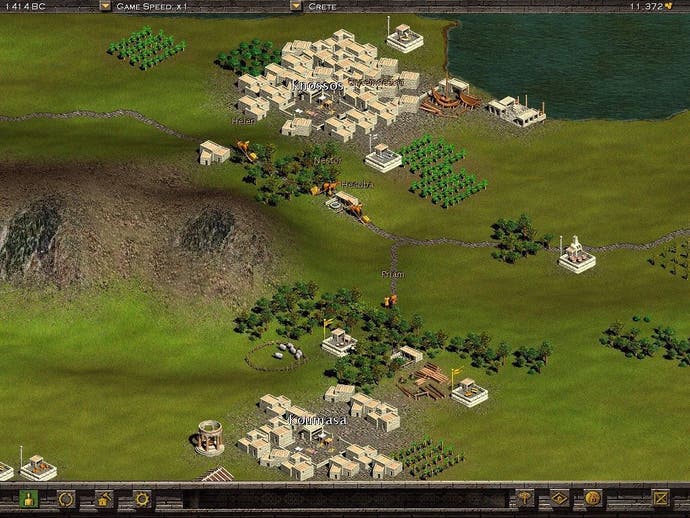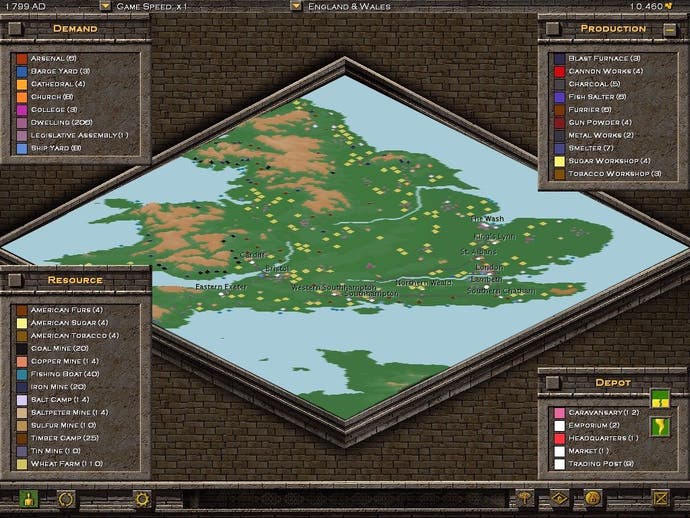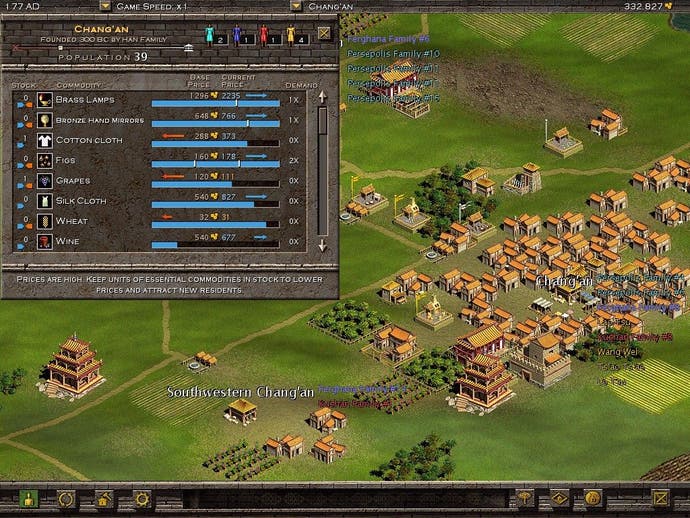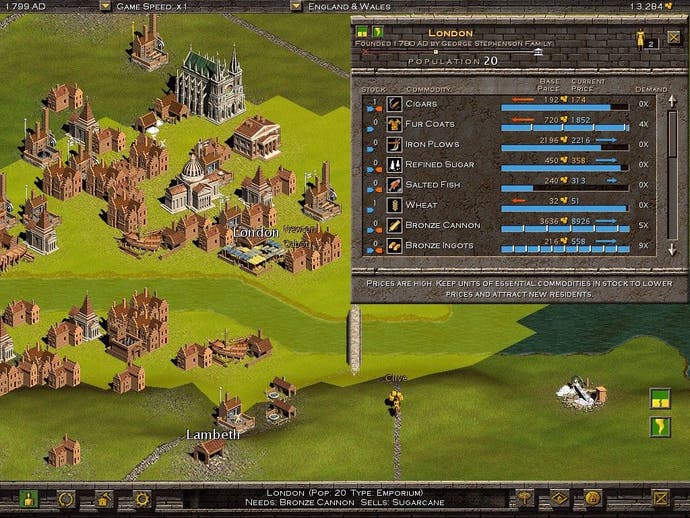Trade Empires
Review - make trade not war in this deeply addictive historical strategy game

Show Me The Money
If Trade Empires is to be believed, the development of civilization is defined not by wars and diplomacy but by trade. Instead of conquering new territory by invading neighbouring countries, you spread your influence by setting up markets and supplying them with the goods they require, hopefully at a hefty mark-up. It might not sound tremendously exciting, but the result is a surprisingly deep and addictive experience. Over the course of sixteen scenarios the game covers four thousand years of history and four continents, taking in the birth of Egypt, Sumeria and China, the rise of Greece, Phoenicia and Rome, the colonisation of America and the industrial revolution in Europe amongst other topics. In each mission you will start out with a small amount of cash and be set a target score to achieve by a certain year. Sometimes winning is simply a case of earning lots of money, while in other scenarios you will get bonus points for building up the population of cities or importing specific goods. At first sight the whole thing can look rather bewildering, and while the interface is neatly laid out and fairly logical, it does require a lot of mouse clicking to actually get anywhere. Luckily then there is a helpful tutorial mission to ease you into the game and introduce you to the basic concepts, from setting up your first markets to trading different goods between them. And this is essentially all that you will be doing for the rest of the game.

Supply And Demand
This isn't as repetitive as it may sound though, because while the opening mission has only a few raw materials to trade in a relatively confined area, by the time you get to some of the later scenarios you may have upwards of twenty or thirty different types of goods to trade. Some of these are required by towns if they are to continue growing, while others are luxury or military goods which can bring big profits but are only needed by special buildings such as palaces, fortresses and temples which are dotted around the map. Some raw goods will only be available in one region and may need transporting a long distance before you can sell them, and some must go through more than one factory before they can be turned into anything useful. For example, to build a musket you first need iron ore and wood. The wood is taken to the appropriate facility and turned into charcoal, which can then be burnt in a blast furnace to convert the ore into pig iron. Finally this is taken to a gunsmith, where it is combined with more wood to produce the finished gun. At every step of the way you have the opportunity to make a profit by buying the raw materials cheaply and selling them on at a higher price. Even when you are operating a monopoly though, you can't fix your prices; the whole game's economy depends on basic laws of supply and demand. If a trader has to wait for the goods he needs because of insufficient supplies, the price will gradually rise. If he has to wait to sell goods because there isn't enough demand for them, the price will fall. Needless to say, juggling this for a dozen or more types of goods being bought and sold at several markets spread across anything up to five or six seperate countries can be rather tricky.

Abby Normal
Things get even more complex when rival merchants enter the game, and sadly this is one of the areas where Trade Empires doesn't quite gel. Sometimes your competitors will all chase after the same goods, and you can end up with several merchants from various families all piling into the same town looking to buy and sell the same goods. Needless to say this completely destroys the market and can play havoc with your own trade routes. This problem is made worse by the AI's stubborn refusal to drop goods or move on to another town if a market becomes glutted. Instead rival traders will sit there until they have sold everything they wanted to, by which time the local value of the goods has nosedived. By contrast, once they have wrecked a market's economy and any hope you might have had of making money from it, the computer will constantly switch routes, making it hard to keep up with them and find new markets where you can make a decent profit. In the early stages of the game the AI almost always seems to be one step ahead of you and is constantly getting in your way, although later on as new markets and goods open up things tend to get more spread out and markets can be exploited more sensibly. The way in which raw materials are handled can be a little clumsy at times as well. You can buy any of the various factories and workshops which are scattered throughout the game world and switch them on and off at will, or just leave them to run themselves, but this doesn't extend to sources of raw materials such as timber camps, mines and farms, which are always run by the AI. These tend to build up a big glut of goods when they are first activated, and then switch themselves off as the price starts to drop. Often they will only start working again once the backlog of goods has been completely cleared, and then abruptly stop soon after any new demand has been met. If you are visiting a market infrequently and trying to buy a large quantity of goods at one go, this can be a serious nuisance.

Niggling
All of this can be particularly annoying as there is precious little room for micro-management in the game. Merchants must be assigned to a trade route, with the goods that they will be carrying when they leave each market along the route decided by the player in advance. As you can load, save and edit the routes, this makes it easy to set up and adjust orders for several merchants at once. But if they reach a town and there is no demand for their goods, the local factories have shut down, or they are at the back of a long queue of merchants all waiting to trade the same commodities, your only options are to switch to another one of your pre-defined routes, order the merchant to drop some of the goods they are currently holding or just leave them to wait for the situation to sort itself out. Short of creating a whole new trade route specifically to get your merchant out of this pickle, there is no way to manually bypass their orders. If you edit an existing route the merchant will ignore the changes until they have finished their current run, and there is no way to order them to skip a stop or to leave a market without buying everything on their shopping list. But while these niggles can prove frustrating at times, overall the game is strangely addictive. Rival merchant families can be switched off in the options menu if you find competing with them too much like hard work, and although there is no mission editor or open-ended Civilization-style "sandbox" mode to give the game true longevity, the wide range of scenarios on offer should keep you busy for several weeks. Most of the scenarios introduce a steady stream of new technologies as the years pass, and the new goods and buildings which come with them will keep you on your toes and stop the game from getting overly repetitive. Trade Empires isn't without its flaws, and there are improvements that could be made if it spawns a sequel. But in the meantime, if you're looking for an unusual, intelligent and challenging strategy game with more depth than the Marianas Trench, this could be just what you need.

